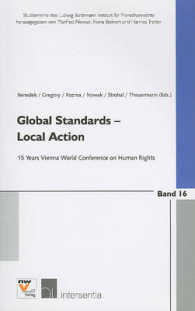Full Description
Japanese Studies has provided a fertile space for non-Eurocentric analysis for a number of reasons. It has been embroiled in the long-running internal debate over the so-called Nihonjinron, revolving around the extent to which the effective interpretation of Japanese society and culture requires non-Western, Japan-specific emic concepts and theories. This book takes this question further and explores how we can understand Japanese society and culture by combining Euro-American concepts and theories with those that originate in Japan. Because Japan is the only liberal democracy to have achieved a high level of capitalism outside the Western cultural framework, Japanese Studies has long provided a forum for deliberations about the extent to which the Western conception of modernity is universally applicable. Furthermore, because of Japan's military, economic and cultural dominance in Asia at different points in the last century, Japanese Studies has had to deal with the issues of Japanocentrism as well as Eurocentrism, a duality requiring complex and nuanced analysis.
This book identifies variations amongst Japanese Studies academic communities in the Asia-Pacific and examines the extent to which relatively autonomous scholarship, intellectual approach or theories exist in the region. It also evaluates how studies on Japan in the region contribute to global Japanese Studies and explores their potential for formulating concrete strategies to unsettle Eurocentric dominance of the discipline.
Contents
List of figures and tables
List of contributors
Acknowledgements
Chapter 1 Rethinking 'Eurocentrism' and Area Studies: Japanese Studies in the Asia-Pacific
Chapter 2 Studying Japan as the 'Other': A Short History of Japanese Studies and Its Future
Chapter 3 Japanese Language Research: Kokugo as an Ideology, Nihongo as an Autonomous Global Scholarship?
Chapter 4 From 'National' Literature to Multicultural Literature in 'Japanese' Language?
Chapter 5 Development of Japanese Studies with a Southeast-Asian Perspective
Chapter 6 Japanese Studies in South Korea
Chapter 7 Australia's View of Japan, as Seen from Japanese Studies
Chapter 8 Transnational Dialogues on Historical Issues Concerning East Asia: Collaborative Project to Write History Textbooks [China, Japan and South Korea]
Chapter 9 Whispering, Writing and Working across Borders: Practising Transnational History in East Asia
Chapter 10 Turning toward a Cosmopolitan Japanese Studies
Bibliography
Index






